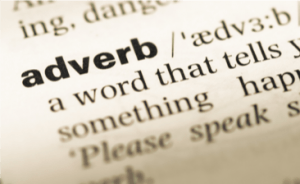by Samantha Herrington
Adverbs are one of the most divisive writing tools in language. Some authors wish to see adverbs in a discarded heap along with sentence fragments and comma splicing. In his acclaimed work On Writing: A Memoir of the Craft Stephen King wrote, “I believe the road to hell is paved with adverbs.” Other authors believe that adverbs enhance how a message is understood: in J.K Rowling’s Harry Potter, adverbs are prolific. Others still are accepting of adverbs in prose but not in the professional world. No matter the opinion one has on adverbs, they weaken professional writing when used in abundance. Here are some examples of when you should skip the adverbs:
- When They Waste Space
 It’s difficult to catch a reader’s attention, let alone keep it. With unlimited options available, readers don’t want to engage in content that makes them feel as if reading becomes work. Adverbs are work. They get tedious. Even the most devoted reader would get exhausted after trudging through sentences upon sentences of, “We kindly ask that you accept the change” or, “This is arguably the best restaurant in town.” Ask for acceptance. Call the restaurant the best. Don’t waste the reader’s time with unnecessary modifiers.
It’s difficult to catch a reader’s attention, let alone keep it. With unlimited options available, readers don’t want to engage in content that makes them feel as if reading becomes work. Adverbs are work. They get tedious. Even the most devoted reader would get exhausted after trudging through sentences upon sentences of, “We kindly ask that you accept the change” or, “This is arguably the best restaurant in town.” Ask for acceptance. Call the restaurant the best. Don’t waste the reader’s time with unnecessary modifiers.
- When They Tell, Not Show
The English language is not lacking in expressive and vivid words. There is a way to say anything and everything without your message sounding weak. In order for writing to be clear, you must show your audience what you mean. Take this example: “Fred laughed loudly”. Here, the reader is explicitly told how Fred laughed. It’s lazy writing. Yes, it gives the reader all of the relevant information, but it doesn’t show the reader anything. Try:
- Fred’s laugh carried through the room.
- The sound of Fred’s laugh could be heard down the street.
See the difference?
- When They Promote Mistrust
When we use adverbs, we basically tell the reader, “Hey, I think you need help in understanding what I’m saying, because I don’t trust that you got it from the context of the writing itself.” Not only is the writer not trusting the reader, the writer is not trusting themselves and their writing ability. Adverbs like “very or “really” are signs of mistrust:
- The new product model is very efficient.
The writer should trust in their choice of the word “efficient” without having to use “very” as a modifier, and they should trust that the reader understands this as well. Writers, believe in your abilities.
So, When Can We Use Adverbs?
When what you are saying cannot be said without the use of an adverb, then use it. Adverbs do serve a purpose when used in moderation. Not all adverbs are bad; in many instances, they help to clarify writing or add stress to a particular thought. However, there are different ways to use adverbs and a professional writer should know when to use them and when not to use them.
Here is a helpful guide that shows the power of a well-placed adverb versus a lazy adverb.